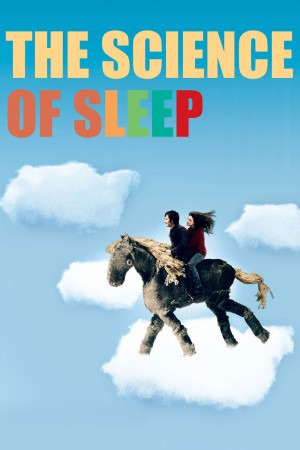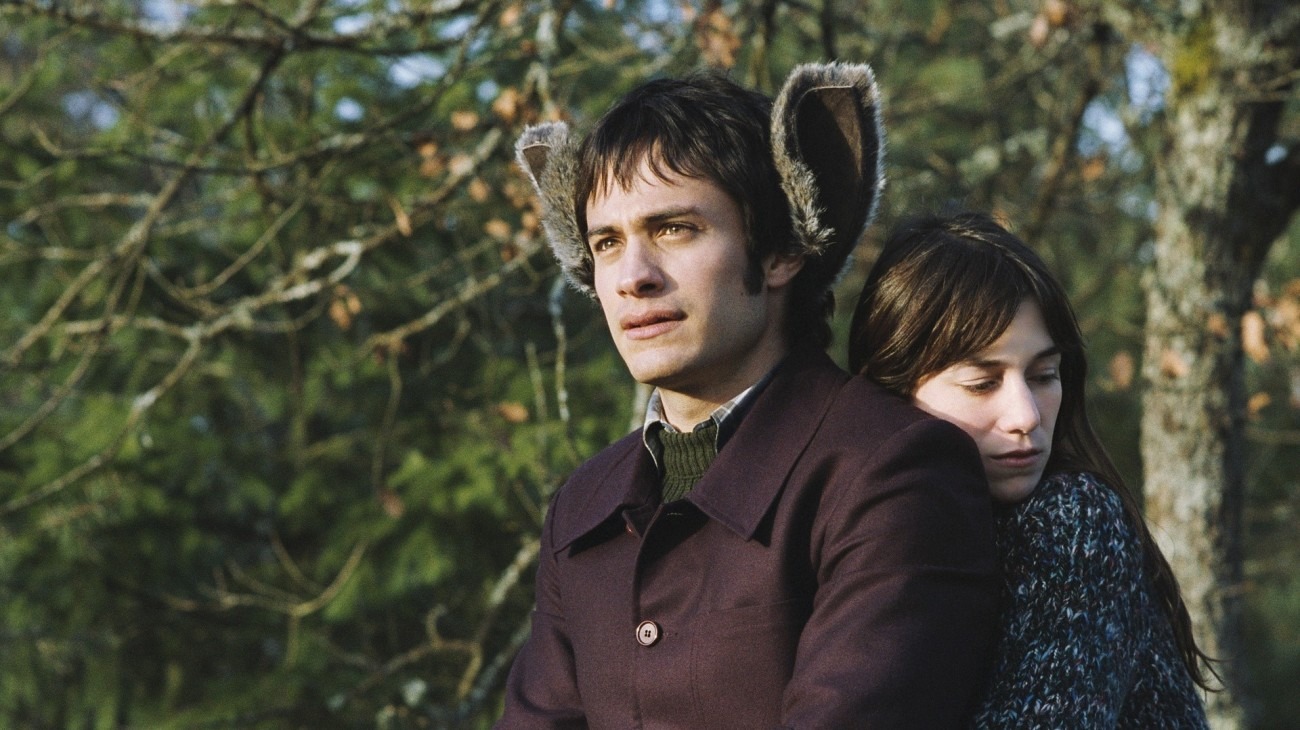
A portrait of the artist as a little boy
There is a documentary about director Michel Gondry titled I've Been Twelve Forever. This is not clever and ironic: it is merely accurate. While filmmakers in general can be said to have a strong case of arrested development, very few are so willfully childish.
This, at least, was at the forefront of my mind while watching The Science of Sleep, Gondry's third feature and the first for which he holds the sole writing credit. It is the story of Stéphane (Gael García Bernal), a young man of French and Mexican descent who returns to live with his mother in Paris after his father's death. Stéphane is a dreamer in the most literal sense, a self-styled inventor and fantasist with a pronounced inability to separate what is real from what he would like to be real. Early on, he meets his new across-the-hall neighbor, Stéphanie (Charlotte Gainsbourg), and despite his intial attraction to her friend, he rather quickly falls head over heels into what ought, by his reckoning, to be a fairytale romance.
It is no discredit to anyone - certainly not Bernal - that Stéphane comes off as rather unlikable. Not that he is an unpleasant protagonist; I never hated him. But it's very difficult to listen to him complain about his problems, moan about his stunted love life, and not shrug it all off with a dismissive, "well, whose fault is that?" Because Stéphane is both narcissistic and solipsistic. His fantasy worlds are so appealing and so wonderful that he can't understand why life isn't exactly the way he imagines it to be, and it makes him pouty.
This is particularly obvious in the scenes he shares with Stéphanie. She is fairly childlike in her own way, but she is also aware of the world and how it functions, and she doesn't seem to be operating in the same pre-sexual haze that Stéphane does. It's evident that she's attracted to him, but is wary of, perhaps even repulsed by, his utter disregard for reality and consequences. This is no Eternal Sunshine of the Spotless Mind, where one nods in recognition of that film's central lovers, even while regarding their mistakes as idiotic; Stéphane's mistakes are not relatable, and it's hard not to feel totally superior to him. It's obvious why Stéphanie finds him compelling, for he is an imaginitive and playful person, but it's just as obvious why she holds him at arm's length.
What's interesting is that this clearly is not Gondry's intent. It's quite evident that he sympathises with Stéphane, who in his creativity and social disfunction is a clear analogue for the writer-director (altough I do not know Gondry's romantic history, other than that he is a father), and he wants us to do the same. But the man-child Gondry and the man-child Stéphane are not sympathetic. They are interesting, and their ideas are fun; but there is no cosmic injustice in their lonliness. Strange, alienating people who deliberately push people's buttons are not the stuff of great lovers. Joel in Eternal Sunshine is a perfect mirror of male sexual and romantic anxiety, but I see nothing familiar in Stéphane other than the urge of the early pubescent boy to show a girl he likes her by throwing toads at her.
This is all besides the real point of the movie, of course, which is to let Gondry's storied visual sense run free. For all that Eternal Sunshine brought him to mainstrem attention (sort of), his greatest work has always been in his extraordinarily avant-garde music videos, whether it be animating the White Stripes in Legos, dropping the Foo Fighters in a Sam Raimi video, or inventing bullet time. The Science of Sleep is an extension of his videos in way that his earlier films never attempted to be. This is largely explored through Stéphane's dreams and fantasies: water comes out of a tap as blue and white cellophane, Paris is reconstructed in cardboard tubes. The effects are almost all achieved in stop-frame animation, and deliberately crude animation at that, giving them a tactility and a reality that most effects lack. They are joyous effects - there is no other word for it. This is the genius of Gondry: he wants us to understand his fantasy as a tangible thing that has some worldliness to it. There is nothing hermetic or sterile about Gondry's world: it is unmistakably hand-hewn. It almost becomes possible to sympathise with Stéphane in these sequences: if your dreams were this fantastic and yet concrete, you would want them to be real too. The script may run aground in wanting us to believe that Stéphane shouldn't have to wake up, but it's not hard to understand why he doesn't; and it speaks well of the film's generosity that at the end it doesn't make us. It leaves us in a dreamworld, where no matter how scary the world outside looks we can still be surrounded by wonderful images, because we are all twelve years old forever.
7/10
This, at least, was at the forefront of my mind while watching The Science of Sleep, Gondry's third feature and the first for which he holds the sole writing credit. It is the story of Stéphane (Gael García Bernal), a young man of French and Mexican descent who returns to live with his mother in Paris after his father's death. Stéphane is a dreamer in the most literal sense, a self-styled inventor and fantasist with a pronounced inability to separate what is real from what he would like to be real. Early on, he meets his new across-the-hall neighbor, Stéphanie (Charlotte Gainsbourg), and despite his intial attraction to her friend, he rather quickly falls head over heels into what ought, by his reckoning, to be a fairytale romance.
It is no discredit to anyone - certainly not Bernal - that Stéphane comes off as rather unlikable. Not that he is an unpleasant protagonist; I never hated him. But it's very difficult to listen to him complain about his problems, moan about his stunted love life, and not shrug it all off with a dismissive, "well, whose fault is that?" Because Stéphane is both narcissistic and solipsistic. His fantasy worlds are so appealing and so wonderful that he can't understand why life isn't exactly the way he imagines it to be, and it makes him pouty.
This is particularly obvious in the scenes he shares with Stéphanie. She is fairly childlike in her own way, but she is also aware of the world and how it functions, and she doesn't seem to be operating in the same pre-sexual haze that Stéphane does. It's evident that she's attracted to him, but is wary of, perhaps even repulsed by, his utter disregard for reality and consequences. This is no Eternal Sunshine of the Spotless Mind, where one nods in recognition of that film's central lovers, even while regarding their mistakes as idiotic; Stéphane's mistakes are not relatable, and it's hard not to feel totally superior to him. It's obvious why Stéphanie finds him compelling, for he is an imaginitive and playful person, but it's just as obvious why she holds him at arm's length.
What's interesting is that this clearly is not Gondry's intent. It's quite evident that he sympathises with Stéphane, who in his creativity and social disfunction is a clear analogue for the writer-director (altough I do not know Gondry's romantic history, other than that he is a father), and he wants us to do the same. But the man-child Gondry and the man-child Stéphane are not sympathetic. They are interesting, and their ideas are fun; but there is no cosmic injustice in their lonliness. Strange, alienating people who deliberately push people's buttons are not the stuff of great lovers. Joel in Eternal Sunshine is a perfect mirror of male sexual and romantic anxiety, but I see nothing familiar in Stéphane other than the urge of the early pubescent boy to show a girl he likes her by throwing toads at her.
This is all besides the real point of the movie, of course, which is to let Gondry's storied visual sense run free. For all that Eternal Sunshine brought him to mainstrem attention (sort of), his greatest work has always been in his extraordinarily avant-garde music videos, whether it be animating the White Stripes in Legos, dropping the Foo Fighters in a Sam Raimi video, or inventing bullet time. The Science of Sleep is an extension of his videos in way that his earlier films never attempted to be. This is largely explored through Stéphane's dreams and fantasies: water comes out of a tap as blue and white cellophane, Paris is reconstructed in cardboard tubes. The effects are almost all achieved in stop-frame animation, and deliberately crude animation at that, giving them a tactility and a reality that most effects lack. They are joyous effects - there is no other word for it. This is the genius of Gondry: he wants us to understand his fantasy as a tangible thing that has some worldliness to it. There is nothing hermetic or sterile about Gondry's world: it is unmistakably hand-hewn. It almost becomes possible to sympathise with Stéphane in these sequences: if your dreams were this fantastic and yet concrete, you would want them to be real too. The script may run aground in wanting us to believe that Stéphane shouldn't have to wake up, but it's not hard to understand why he doesn't; and it speaks well of the film's generosity that at the end it doesn't make us. It leaves us in a dreamworld, where no matter how scary the world outside looks we can still be surrounded by wonderful images, because we are all twelve years old forever.
7/10
Categories: fantasy, indies and pseudo-indies, love stories






